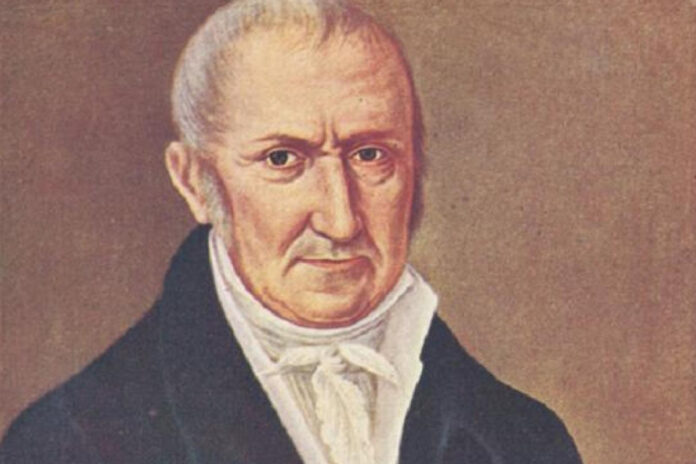Alessandro Volta, an eminent Italian physicist and chemist, is best known for his pioneering work in electricity and the invention of the electric battery. His contributions laid the foundation for the field of electrochemistry and opened new avenues for scientific and technological advancements. This article delves into Volta’s life, his significant contributions, and his enduring legacy.
Early Life and Background
Birth and Family
Alessandro Giuseppe Antonio Anastasio Volta was born on February 18, 1745, in Como, a town in Lombardy, Italy. He was born into a noble family with a modest background. His father, Filippo Volta, was of noble descent but not wealthy, and his mother, Maria Maddalena dei Conti Inzaghi, belonged to a family of minor nobility. Volta was the youngest of seven children.
Early Education and Influences
Volta showed an early interest in science and mathematics. He attended the Royal Seminary of Como, where he received a classical education. His teachers recognized his potential and encouraged his scientific pursuits. Volta was influenced by the works of Isaac Newton and Benjamin Franklin, which inspired his early experiments in electricity.
Career and Scientific Contributions
Early Career and Inventions
In 1774, Volta was appointed professor of physics at the Royal School in Como. During this period, he invented the electrophorus, a device used to generate static electricity. This invention was an early indicator of Volta’s ingenuity and his interest in the study of electrical phenomena. The electrophorus consisted of a metal plate and an insulating handle, allowing it to generate and transfer static electric charge.
Discovery of Methane
In 1776, Volta discovered and isolated methane gas in the marshes near Lake Maggiore. He conducted experiments to study its properties, demonstrating that it could be ignited with an electric spark. This discovery was significant in the field of chemistry and showcased Volta’s versatility as a scientist.
Voltaic Pile: The First Electric Battery
Volta’s most groundbreaking invention came in 1800 with the creation of the voltaic pile, the first true electric battery. This device consisted of alternating discs of zinc and copper, separated by pieces of cardboard soaked in saltwater. When connected by wires, the pile produced a steady electric current. This invention was a monumental leap in the study of electricity, providing a reliable source of continuous current for the first time. The voltaic pile laid the groundwork for the development of electrochemistry and had a profound impact on various scientific and technological fields.
Significance of the Voltaic Pile
The invention of the voltaic pile had far-reaching implications. It provided a consistent and measurable source of electricity, enabling scientists to conduct experiments that were previously impossible. The voltaic pile led to the discovery of new elements and compounds through electrolysis, the process of using electric current to drive chemical reactions. Volta’s invention also paved the way for the development of electric motors, generators, and countless other applications that have shaped modern society.
Major Achievements and Awards
Recognition by the Royal Society
In recognition of his contributions to science, Volta was elected a Fellow of the Royal Society in 1791. The Royal Society, one of the most prestigious scientific institutions in the world, acknowledged Volta’s significant advancements in the field of electricity.
Napoleon’s Support and the Legion of Honor
Volta’s work caught the attention of Napoleon Bonaparte, who invited him to Paris in 1801 to demonstrate the voltaic pile. Napoleon was impressed by Volta’s invention and awarded him the Legion of Honor. He also appointed Volta as a professor of philosophy at the University of Pavia, where Volta continued his research and teaching.
Other Prestigious Awards and Honors
Volta received numerous other awards and honors throughout his career, including:
- Copley Medal (1794): Awarded by the Royal Society for his contributions to electrical science.
- Count of the Kingdom of Lombardy (1810): Bestowed by Napoleon in recognition of his scientific achievements.
- Gold Medal from the Institut de France (1806): Acknowledging his pioneering work in electricity.
Later Years and Legacy
Retirement and Personal Life
In 1819, Volta retired to his family estate in Como, where he continued to conduct experiments and correspond with other scientists. Despite his retirement, Volta remained intellectually active and engaged in scientific discourse. He was known for his humility and dedication to science, often eschewing public recognition in favor of continued research.
Death and Commemoration
Alessandro Volta passed away on March 5, 1827, in Como, Italy. His death marked the end of a remarkable life dedicated to scientific discovery. Volta’s contributions to science were commemorated through various institutions, awards, and honors named in his memory. The unit of electric potential, the volt, was named in his honor, reflecting his lasting impact on the field of electricity.
Impact on Science and Technology
Foundation of Electrochemistry
Volta’s invention of the voltaic pile laid the foundation for the field of electrochemistry. His work demonstrated the relationship between chemical reactions and electrical current, leading to the discovery of electrolysis. This process enabled scientists to isolate and study new elements, advancing our understanding of chemical reactions and the composition of matter.
Influence on Future Discoveries
Volta’s contributions influenced many subsequent discoveries and technological advancements. The voltaic pile provided a reliable source of electricity, enabling further experimentation and innovation. Scientists such as Humphry Davy and Michael Faraday built upon Volta’s work, leading to the development of electric motors, generators, and other electrical devices that have transformed modern society.
Impact on Modern Technology
Volta’s legacy extends to numerous modern technologies that rely on the principles he discovered. Batteries, a direct descendant of the voltaic pile, power a wide range of devices, from portable electronics to electric vehicles. Volta’s pioneering work in electricity has had a profound and lasting impact on various fields, including physics, chemistry, and engineering.
Challenges and Triumphs
Overcoming Skepticism
Volta faced skepticism and resistance from some of his contemporaries, who were reluctant to accept his groundbreaking discoveries. Despite these challenges, Volta remained committed to his research, conducting meticulous experiments to demonstrate the validity of his findings. His perseverance and dedication eventually won over his critics and earned him widespread recognition.
Navigating Political Turmoil
Volta’s career unfolded during a period of significant political upheaval in Europe, including the Napoleonic Wars and the subsequent reshaping of political boundaries. Despite the turmoil, Volta managed to secure support and patronage from influential figures such as Napoleon Bonaparte, enabling him to continue his research and achieve lasting success.
Personal Reflections and Legacy
Reflections on Career
In his later years, Volta often reflected on his career and the impact of his work. He expressed pride in his contributions to science and how his discoveries had advanced our understanding of electricity. Volta’s reflections provide valuable insights into the mindset of a pioneering scientist and the challenges he faced in his pursuit of knowledge.
Lasting Legacy
Alessandro Volta’s legacy is evident in the numerous advancements and ongoing research in electricity and electrochemistry. His name is commemorated in various institutions, awards, and programs that continue to promote scientific research and education. Volta’s work has had a lasting impact on the field of electricity and continues to inspire future generations of scientists.
FAQs
1. What are some of Alessandro Volta’s most significant achievements?
Alessandro Volta’s most significant achievements include the invention of the voltaic pile, the first electric battery, and the discovery of methane. He also invented the electrophorus, a device used to generate static electricity.
2. How did Alessandro Volta influence the development of modern technology?
Alessandro Volta influenced the development of modern technology by laying the groundwork for the field of electrochemistry and providing a reliable source of electricity through the voltaic pile. His discoveries enabled further experimentation and innovation, leading to the development of batteries, electric motors, and generators.
3. What awards and recognitions did Alessandro Volta receive?
Alessandro Volta received numerous awards and recognitions, including the Copley Medal from the Royal Society, the Legion of Honor from Napoleon Bonaparte, and the title of Count of the Kingdom of Lombardy. He was also elected a Fellow of the Royal Society and received a gold medal from the Institut de France.
4. How did Volta’s early life and challenges shape his career?
Volta’s early life and challenges, including his modest upbringing and the skepticism he faced from some contemporaries, shaped his career by fostering a deep passion for scientific research and a determination to overcome adversity. These experiences influenced his approach to science and his ability to make groundbreaking discoveries.
5. What is Alessandro Volta’s lasting legacy?
Alessandro Volta’s lasting legacy is his extraordinary contribution to the field of electricity and electrochemistry. His work laid the foundation for modern technology and continues to inspire scientists and engineers worldwide.
Conclusion
Alessandro Volta’s contributions to science and his enduring legacy are unparalleled. His groundbreaking work in electricity, particularly the invention of the voltaic pile, revolutionized our understanding of electrical phenomena and laid the foundation for numerous technological advancements. From his early experiments with static electricity to his recognition as one of the greatest scientists of his time, Volta’s journey is a testament to his brilliance and determination. His achievements continue to inspire and influence scientists, educators, and thinkers worldwide. As one of Italy’s greatest scientific legends, Alessandro Volta’s legacy will endure for generations to come, ensuring that his name remains synonymous with innovation and the advancement of science.




